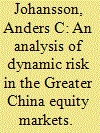| Srl | Item |
| 1 |
ID:
089969


|
|
|
|
|
| Publication |
2009.
|
| Summary/Abstract |
This study looks at the time-varying nature of systematic risk in the Greater China equity markets. The Shanghai and Shenzhen markets both have a low average systematic risk when measured against the world market. The short outbursts in systematic risk for these two markets seem to be directly related to policy shifts. The Hong Kong and Taiwan markets are more integrated with world markets and they show signs of large variations in systematic risk over time. Furthermore, conditional betas in the Shanghai and Shenzhen markets are stationary, while the Hong Kong and Taiwan betas are integrated of order one. In addition, long memory tests show that all four markets exhibit a long-run dependence in their conditional betas. While the two mainland China market betas are covariance stationary, the Hong Kong and Taiwan betas are not.
|
|
|
|
|
|
|
|
|
|
|
|
|
|
|
|
| 2 |
ID:
100260


|
|
|
|
|
| Publication |
2010.
|
| Summary/Abstract |
It is commonly argued that China's financial markets are effectively insulated from the rest of the world. To see if this is true, and to better understand China's financial development, we analyse China's integration with major financial markets. Using conditional copulas, we show that China has experienced an increasing level of integration with several major financial markets during the last decade, albeit at a slow pace and from very low levels. Furthermore, the level of integration has increased with several major markets during the global financial crisis. The results and possible reasons for the increasing integration are analysed and the implications for policymakers and market participants are discussed.
|
|
|
|
|
|
|
|
|
|
|
|
|
|
|
|
| 3 |
ID:
134855


|
|
|
|
|
| Summary/Abstract |
We study the effects of political participation on holdings of liquid assets in Chinese privately controlled listed firms. Previous research has shown that the risk of political extraction by politicians and bureaucrats in countries with weak institutions has an adverse effect on holdings of liquid assets. We propose that political participation by private entrepreneurs can function as a means to alleviate some of that risk. We find that political participation in China is positively related to cash holdings in regions with weaker institutions. Our results also show that investments in “hard” assets such as PPE and inventories, which are less susceptible to the grabbing hand, are higher in regions with weaker institutions, but that political participation mitigates this effect. Finally, cash holdings have an insignificantly positive effect on firm value on its own, while political participation is positively associated with firm value. The interaction between cash holdings and political participation is positively related to firm value, again suggesting that political participation facilitates the holding of liquid assets in China, which in turn results in better firm performance.
|
|
|
|
|
|
|
|
|
|
|
|
|
|
|
|
| 4 |
ID:
136275


|
|
|
|
|
| Summary/Abstract |
While finance has been shown to influence the distribution of income, little research has been devoted to the potential impact of financial policy on income inequality. This study analyzes the relationship between repressive financial policies and inequality across countries. We show that financial repression tends to increase income inequality. Robustness checks using GMM estimation and the modeling average method confirm the positive relationship between financial repression and income inequality. We also find that credit controls and entry barriers in banking sector are the two most important financial policies influencing inequality. Moreover, GDP per capita growth and urbanization serve as two important factors that might alleviate income inequality. These results have important policy implications, not the least so for quickly developing countries such as China, where rising inequality possesses a significant problem.
|
|
|
|
|
|
|
|
|
|
|
|
|
|
|
|
| 5 |
ID:
159060


|
|
|
|
|
| Summary/Abstract |
We study the role of excessive employment as a selection criterion for initial public offerings (IPOs) in China. Using a large dataset of firms that are eligible for a public offering, we find that firms' that have more excess employment – that is, firms that hire too many people – are more likely to be selected for an IPO. This correlation is stronger for the private sector than for the state sector, suggesting that stock market capital is used to direct capital flows to private firms that comply with politicians' preferred labor practices. A third set of results corroborates the inefficiency of this selection rule by showing that firms with more excess labor underperform after the IPO. We conclude that a political system known for its interventionistic government policies uses its influence over the stock market to signal preferred employment practices.
|
|
|
|
|
|
|
|
|
|
|
|
|
|
|
|
| 6 |
ID:
092541


|
|
|
|
|
| Publication |
2009.
|
| Summary/Abstract |
This paper tries to answer the long-standing question of whether money causes output. Instead of focusing on domestic monetary policy and output, we analyze U.S. monetary policy and its possible effects on real output in China. Our results indicate that the main monetary instrument in the U.S., the Federal Fund Rate, Granger causes China's output. A second monetary variable, U.S. money supply, does not seem to have a significant effect on China's output. The results are supported by variance decompositions, which indicate that Federal Fund Rate shocks have an effect on China's real output. The findings have important implications for policy makers in China that focus on maintaining a high and stable economic growth.
|
|
|
|
|
|
|
|
|
|
|
|
|
|
|
|